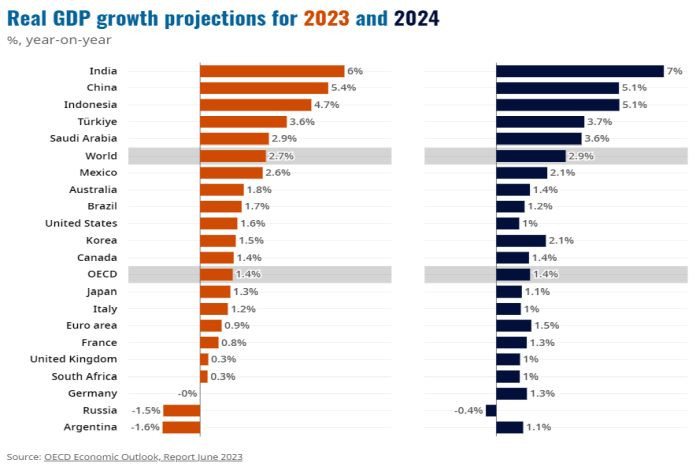PARIS, France, (OECD) – The global economy has begun to improve, but the recovery will be weak, according to the OECD’s latest Economic Outlook. The Economic Outlook projects a moderation of global GDP growth from 3.3 percent in 2022 to 2.7 percent in 2023, followed by a pick-up to 2.9 percent in 2024.
Lower energy prices are easing the strain on household budgets, business and consumer sentiment are recovering, albeit from low levels, and the re-opening of China has provided a boost to global activity.
Headline inflation in the OECD is projected to decline from 9.4 percent in 2022 to 6.6 percent in 2023 and 4.3 percent in 2024. The decline in inflation is due to tighter monetary policy taking effect, lower energy and food prices and reduced supply bottlenecks.
GDP growth in the United States is projected to be 1.6 percent in 2023, before slowing to 1.0 percent in 2024 in response to tight monetary and financial conditions. In the euro area, declining headline inflation will help to boost real incomes and contribute to a pick-up in GDP growth from 0.9 percent in 2023 to 1.5 percent in 2024. China is expected to see strong increases in GDP growth in 2023 (with 5.4%) and 2024 (with 5.1%), due to the lifting of the government’s zero-COVID policy.
“This projected recovery, while almost unchanged from our interim projections in March, maintains the slightly more optimistic outlook that had been predicted and which we are now seeing materialise,” said, OECD secretary-general Mathias Cormann.
“Policymakers must get inflation durably down to target and unwind broad fiscal support by better targeting fiscal measures. While continuing to respond to the immediate economic challenges, it remains important to prioritise structural reforms to boost productivity, including by promoting competition, reviving investment, increasing female workforce participation and alleviating supply constraints, while securing the green and digital transformations of our economies.”
The upturn remains fragile and risks are tilted to the downside. Uncertainty over the evolution of Russia’s war of aggression against Ukraine and its global impact remains a key concern. Some of the favourable conditions that helped to reduce energy demand this year, like a mild winter in Europe, may not be repeated next year.
The persistence of inflation is another key downside risk. Core inflation is proving sticky, on the back of strong service price increases and higher profits in some sectors. The impact of higher interest rates is increasingly being felt across the economy, and restrictive monetary policy, while necessary, risks further exposing financial vulnerabilities, in particular in countries with high debt.
Against this backdrop, the Outlook lays out a series of policy recommendations, underlining that the need to lower inflation, adjust fiscal policy and promote sustainable growth entails significant challenges for policymakers.
Monetary policy should remain restrictive until there are clear signs that underlying inflationary pressures are durably reduced. Fiscal support, which has played a vital role in helping the global economy through the pandemic and the war in Ukraine, should be scaled back, becoming more targeted and calibrated toward future needs. Broad energy-related support should be withdrawn as energy prices fall and minimum wages and welfare benefits are being increased to take account of past inflation in many countries.
“Fiscal policy should prioritise productivity-enhancing public investments, including those driving the green transition and boosting labour supply and skills,” said, OECD chief economist Clare Lombardelli. “Renewed reform efforts to reduce constraints in labour and product markets and to reignite private investment and productivity growth would improve sustainable living standards and strengthen the recovery from the current low growth outlook.”
The Outlook includes a special chapter dedicated to women’s economic empowerment, setting out policy recommendations, including expanding flexible work arrangements, addressing tax and benefit disincentives and improving access to childcare. It highlights that removing structural barriers and discrimination to realise gender equality, must be a high priority to boost long-term economic well-being and prosperity.




